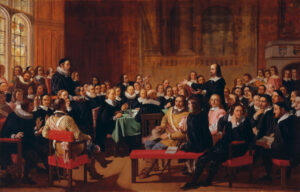In the first post, I pointed out that the reason the site is called GodwardGod is to make the site’s focus what is God’s focus, namely Himself. We said that this biblical reality is outlined in texts like Isaiah 48:9–11 and is the first of two massive realities outlined in Jonathan Edwards’s The End for Which God Created the World (1765).
In this post we are going to be looking at the second massive reality that Edwards commends in his magisterial book—namely, that our joy is found supremely in making much of God. The very essence of “joy,” according to Edwards, is “the exulting of the heart in God’s glory.”1 And it is here that Edwards unpacks the relationship between God’s seeking of His glory, His seeking of our joy, and our seeking of our joy by seeking His glory. Edwards sees these three things as intrinsically connected in God’s ordering of the universe. He argues that by God’s seeking of His glory and encouraging those He created likewise to make the single aim of their life to exult in Him, He is seeks the everlasting and ever-increasing joy of his creatures. As Edwards says, “God in seeking his glory, therein seeks the good of his creatures: because the emanation of his glory (which he seeks and delights in, as he delights in himself and his own eternal glory) implies the communicated excellency and happiness of his creature. And that in communicating his fullness for them, he does it for himself: because their good, which he seeks, is so much in union and communion with himself. God is their good. Their excellency and happiness is nothing but the emanation and expression of God’s glory: God in seeking their glory and happiness, seeks himself: and in seeking himself, i.e. himself diffused and expressed (which he delights in, as he delights in his own beauty and fullness), he seeks their glory and happiness.”2
Don’t miss this. It is completely counter-cultural to our society’s understanding of joy—namely, that joy comes in being made much of and establishing one’s own self-made identity using the tools of the age (first and foremost, social media). It is also counter to how most Christians (indeed Reformed Christians) think of the point of worship, namely, to completely shrug off any motivations of self-interest. I cannot begin to tell you how many times I’ve heard well-meaning Christians say on Sunday mornings “we are here not for ourselves, but to give worship to God.” However, what Edwards points out is that while there can be a sinful kind of self-interest, there is also a God-designed self-interest, in which Christians are by God’s very design to seek their own good in glorifying God. Indeed, since God’s “happiness consists in enjoying and rejoicing in himself” “so does also the creature’s happiness” “[consist] in rejoicing in God; by which also God is magnified and exalted.”3
In essence, the reason this site if called Godward God is that we “join God in enjoying making much of Him.” A central conviction of this site is that the pursuit of God’s glory is indeed enjoyable and that the greatest joy that one can have in live is in making much of Him. And the reason we enjoy making much of Him is because we were created to do so. We were created to enjoy making much of Him because that’s exactly what God Himself does—He takes great delight in making much of Himself.
[1] Jonathan Edwards, Dissertation Concerning the End for Which God Created the World, in Ethical Writings, ed. Paul Ramsey, vol.8 in Works of Jonathan Edwards (New Haven: Yale University Press, 1989), p.442.
[2] Edwards, The End for Which God Created the World, in WJE, 8:459.
[3] Edwards, The End for Which God Created the World, in WJE, 8:442.



